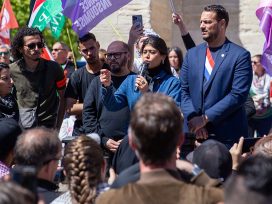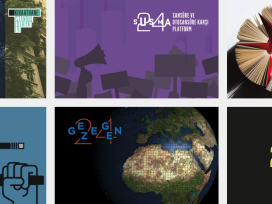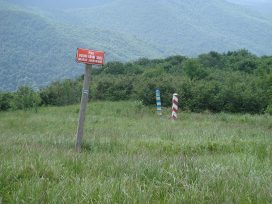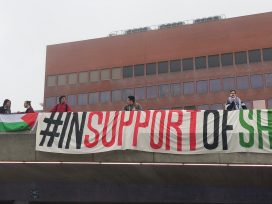Just imagine: You are a nineteen-year-old, uneducated Tibetan woman from a small village. You have already spent a couple of years in a nunnery in Tibet. The year is 1989. You and three other nuns are standing in a square in Lhasa. On hearing the news that the Dalai Lama has been awarded the Nobel Peace Prize, you cheer: “Long live the Dalai Lama!” But before you get to finish off with “…and a free Tibet!” you are carted off by Chinese soldiers. Your arms, twisted up your back, become numb in the excruciating hold. During the subsequent torture, your entire face is burnt with cigarettes stubbed out on it. And the thick sewing needles that pierce your fingers leave in their wake stabbing pains that last for days. Your new daily routine consists of abuse and beatings. Your rejoicing over the Dalai Lama was an “illegal demonstration” – the sentence is nine years in prison. Isolated in the cells during the years that follow, it’s hard enough to hear what’s happening in the next cell, much less in the outside world. The newspaper of the Chinese occupation is available; the Tibetan newspaper is perforated with cut-out holes.
And so you spend your twenties in a little cell with some other nuns. The metal pail you relieve yourself into is constantly overflowing. It stinks. And you are cold. The law safeguarding the equal treatment of prisoners patently doesn’t apply to Tibetans. One day you can’t take it anymore and go on hunger strike in your cell – the guards come just as your life is at its lowest ebb. And so life goes on in the cell; maybe your pail is emptied a bit more frequently. Another day you hear screams and commotion from the prison courtyard: prisoners are protesting against the hoisting of the Chinese flag. Soldiers positioned in the rooftops shoot mercilessly into the crowd. Then the corpses are carried away.
Some years pass. In 1993, you and 13 other nuns manage to make a recording of songs paying homage to a free Tibet – a recording which, incredibly, is distributed throughout the world; the original intention was really only to give the prisoners’ families a “sign of life”. You achieve global recognition and become known as the “Drapchi 14”. But here in prison, it is labelled “counter-revolutionary propaganda” and you are sentenced to a further eight years in prison. You are still alive. You are prepared to spend the rest of your life in captivity.
But an American delegation gets involved after hearing about the “singing nuns”. In the end, the authorities release you. It is 2004, and you spend the following year with your family under house arrest. Then – after further pressure from the US – you get the chance to leave Chinese-occupied Tibet. First, the Chinese authorities get you to sign an agreement that you will never give political expression to what happened to you – “or your family here will suffer”. But the Tibetan situation is more important to you than your own family – the family is in accord. You are now 34 years old and you dedicate your life to the Tibetan cause, to bearing witness to the world about the abuses you have endured.
Your name is Phuntsog Nyidron. You have survived 15 years as a political prisoner in Drapchi prison. Now, on a visit to Oslo, you are the guest of Human Rights House. The ten of us, who came here to meet you on this blindingly sunny day in late December, listen to your nasal and intensely soft-spoken Tibetan voice, supplemented by the interpreter – here in the Nobel committee’s homeland.
2006 is over. Is it possible to assess whether global conditions for freedom of expression, divergent opinions, and opportunities for protest have improved?
Even if statesmen like Pinochet eventually die, there are still enough of them wielding power: Russia’s Putin has introduced laws to imprison or globally eliminate “extremist critics” of his state power. Last summer, the British followed the US’s example by introducing laws restricting any fundamental criticism of the system. Is that in principle so different from the imprisonment in Tibet? Because if one supports freedom fighters – a Dalai Lama, a Chechen or Palestinian – one can quickly be judged the accomplice of terrorists or terrorist organisations.
Previously, the Russians eliminated liberated Chechen prisoners with plutonium; now the very same thing is happening in London in broad daylight. And if poisoning is unsuccessful, a few well-aimed shots can be fired into your chest or your disobedient journalist’s head. Poisoning is normally difficult to trace – as Israel’s Sharon articulated with his “Let me do things my way!”
State authorities wield the power after all: on the other side of the globe, a proportion of the research into 9/11 is still being kept under wraps. Hardly strange, then, that increasing numbers of people are becoming suspicious of the official American line. Bush and his administration repeatedly denied that they could have foreseen a passenger plane striking New York’s Twin Towers five years ago. But a documentary from last year tells how they had received at least four clear warnings about precisely this from cooperating intelligence agencies (ISI, Mossad, etc.). Another documentary, broadcast on Swedish television last year, also showed how US research commissions, sent to Iraq to locate weapons of mass destruction and track Saddam’s purported uranium deal in Africa, came home empty-handed. How could President Bush appear on TV after this and tell the nation the exact opposite? Because it was enough that the majority continued to believe the lies.
Some stand to gain from the creation of vivid images of the enemy. Historically, it is also known that Western heads of state and their adjuncts have frequently made use of “false flag” operations to stage attacks where the blame is laid squarely at the enemy’s feet. Hitler set fire to the Reichstag and laid the blame on “the others”. You can also stop believing that it was “Chechen terrorists” who bombed those apartment blocks in Moscow right before Putin won his first presidential election. Unfortunately, today’s media have contributed to the creation of terrorist myths that further legitimise violent reprisals. The objective is to strengthen one’s own state powers.
Presidents-in-waiting are smart: George Bush senior became vice-president of the US under Ronald Reagan when he negotiated with Iran’s Ayatollah Khomeini over the detention of American hostages. President Reagan was subsequently caught lying openly about this on TV. The hostage affair contributed to Jimmy Carter’s failure to win the presidential election: the same Carter who recently accused Israel of conducting a system of apartheid worse than South Africa’s. Last year, Norway – “a different country” – evinced a severe lack of backbone when it subserviently supported an international boycott on the democratically elected Hamas. It is not enough to excuse this by stating that Norway has given more money to other Palestinian organisations; what they have done is ignored the choice of the Palestinian people, the principle of sovereignty, and the acknowledged opposition of the people to a corrupt Fatah and Israeli oppression. At least Norway’s �got Valle of the Socialist Left party has now reacted to the resolution.
So it’s not just in China that opposition is stifled. It is typical for those wielding power to torture their opponents to the point where they are driven to strike back. Those in power have quite simply and cynically provoked this reaction, so as to be able to label the oppressed “violent” or “terrorist”, and later to accuse, to scapegoat and “legitimately” cut them down. It’s not just Chechens or Palestinians who are exposed to these Machiavellian methods.
My hope for 2007 is that there will always be sufficient numbers of Tibetans, Muslims, and Western citizens that continue to protest, rather than end up dangling like puppets in the theatre of the privileged. Our opposition has found new expression, well aided by modern technology and the Internet: in 2006 the increase in the number of new documentary films was incredible. An undercurrent of protest and information is today taking shape on the PC screen.
As far back as 1991, we will recall the aftermath of the Rodney King affair in Los Angeles, where four white policemen were filmed beating a black taxi driver to within inches of his life. Reactions were overwhelming when the policemen were acquitted. The video footage from the Twin Towers ten years later evoked a tidal wave of reaction around the world – even if it didn’t exactly contribute to making it a fairer place.
But most of what is made in the way of political documentary or social critique has a right to show injustice – and moving images can inspire ethical action and reaction. With a cheap video camera and mobile phone, the “proletariat” has got its hands on the means of production. For this reason, clever montage and documentary work at a grassroots level can lead freedom of expression and protest movements onwards and upwards. In Norway, the documentary form receives special support from The Freedom of Expression Foundation, which recently donated six million Norwegian kroner to promote documentary photography.
Dear Phuntsog Nyidron: Had I had in my hand my little mobile phone with integrated video camera in that Lhasa square 17 years ago, you would definitely have become aware of outside involvement a great deal earlier.






